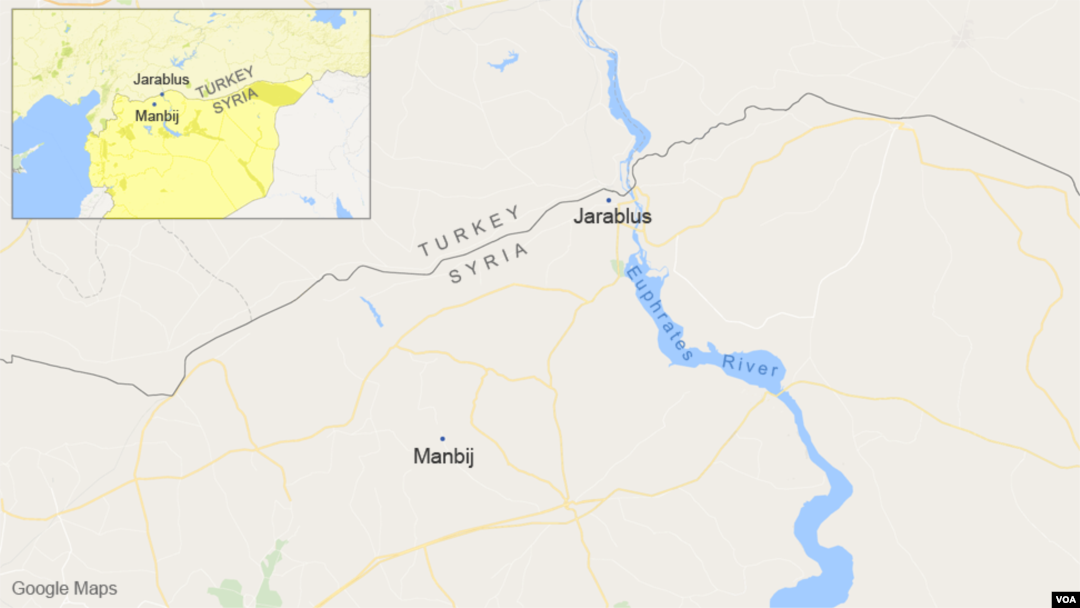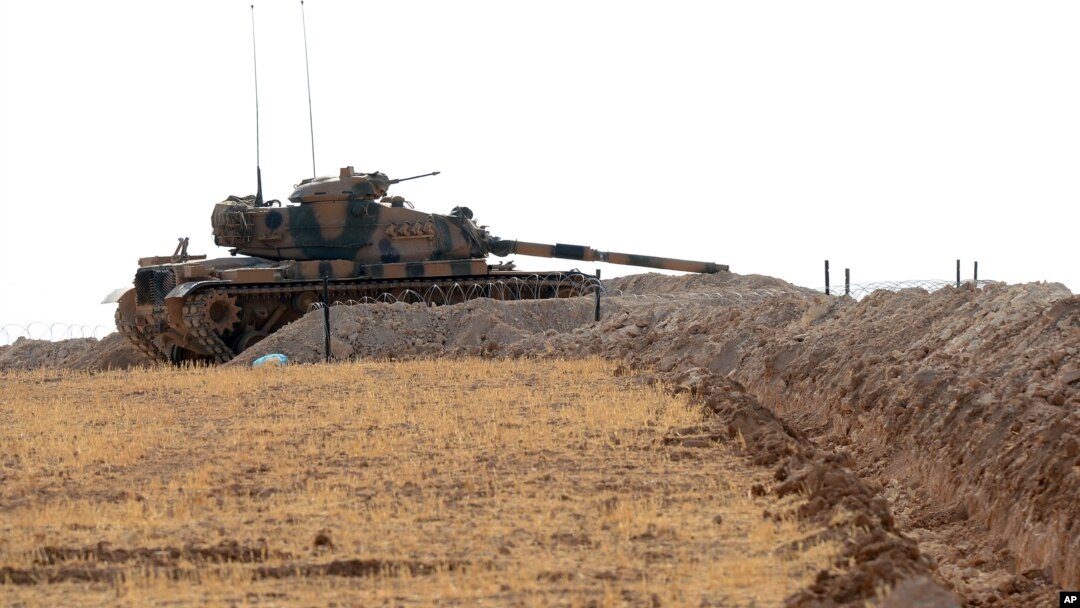U.S. Defense Secretary Ash Carter has called on Turkey to "stay focused'' on the fight against Islamic State and not to engage with U.S.-allied Kurdish forces also battling the terror group in Syria.
The Turkish military and its Syrian rebel allies are in the sixth day of a campaign designed to drive IS militants and Kurdish YPG members, who are part of the U.S.-backed Syrian Democratic Forces, out of the Syria-Turkey border town of Jarablus and its surrounding areas.
"The United States was very supportive, and is very supportive of their [Turkey's] general counter-ISIL activities and everything they did to secure the area between the border and Jarablus and then westward, but not south of Jarablus," Carter told reporters Monday at the Pentagon, using an acronym for Islamic State.
Kurdish forces recently helped push Islamic State militants out of the Syrian city of Manbij, about 40 kilometers south of Jarablus and about 30 kilometers west of the Euphrates River.

The U.S. says Kurdish YPG forces have given assurances that they will return east of the river once Manbij is clear of IS forces. Carter said Monday that those forces "will withdraw and are withdrawing east," and that the U.S. is trying to clarify to Turkey where different elements of the SDF (Syrian Democratic Forces, which includes Kurdish fighters) are, in order to prevent further confrontations.
Your browser doesn’t support HTML5
Carter Calls on Turkey to ‘Stay Focused’ on Islamic State
Stand down ‘immediately'
Earlier in the day, the United States said the clashes between Turkish forces and units affiliated with a U.S.-supported Kurdish-led alliance are "unacceptable," and it called on all sides to stand down "immediately."
"This is an already crowded battle space," Pentagon press secretary Peter Cook told VOA when asked about the recent fighting south of the Syrian town of Jarablus. He added that Islamic State forces are no longer located in the areas where clashes are taking place.
"The U.S. is prepared to support Turkey in operations against IS, but also fully supports the Kurdish-led forces in efforts to defeat the militant group," Cook said.
U.S. forces did not take part in either the Turkish airstrikes and artillery shelling of positions south of Jarablus or the firing against Turkish forces in this area, according to the Pentagon.
"The United States was not involved in these activities. They were not coordinated with U.S. forces, and we do not support them," Cook said.
The Pentagon press secretary expressed condolences to Turkey for the apparent loss of a Turkish soldier during the clashes, and he stressed the need for unity in the fight against Islamic State.
FILE - Kurdish fighters from the People's Protection Units (YPG) stand near a military vehicle in the southeast of Qamishli city, Syria, April 22, 2016.
"Uncoordinated operations and maneuvers only provide room for ISIL to find sanctuary and continue planning attacks against Turkey, the SDF, the United States, and our partners around the world," Cook added.
Civilian deaths
Syrian rebels supported by Turkey have taken control of at least four villages and one town from Kurdish-led forces in the area, amid reports that Turkish airstrikes claimed the lives of at least 35 civilians.
Monitors from the Britain-based Syrian Observatory for Human Rights say that in the attacks Sunday, 20 people were killed in the village of Jub-al-Kousa, while 50 people were wounded in an area controlled by militia allied with the Kurdish-backed Syrian Democratic Forces. The Observatory says another airstrike killed 15 civilians and wounded 20 others near the town of Al-Armana.
The Turkish military said Sunday that its airstrikes in northern Syria killed 25 Kurdish militants, and denied that civilians had also been killed. The Turkish military also said it is committed to protecting civilians under international law.
Turkey's state-run Anadolu news agency said the dead Kurdish militants were "terrorist members" of the Turkey-based Kurdistan Workers Party (PKK) and the Syrian Democratic Union Party (PYD).
Turkey's President Tayyip Erdogan greets people at the United Solidarity and Brotherhood rally in Gaziantep, Turkey, Aug. 28, 2016.
Turkish President President Recep Tayyip Erdogan said at the rally Sunday that residents of Jarablus are returning to their homes after Turkish-backed forces recaptured it from IS.
He praised his armed forces for forcing IS militants from Jarablus. "They were attacking us from across the borders, now they are running away," Erdogan said, vowing to pursue the fleeing terrorists.
Turkey's military foray into Syria is a dramatic escalation of Ankara's involvement in the Syrian civil war.
The clashes bolster Western concerns that Turkey's military incursion into Syria is intended, in part, to target U.S.-supported Kurdish forces known as the Kurdish People's Protection Units, the YPG militia. The U.S. has described the YPG as one of its most effective allies in the fight against Islamic State, while Turkey is demanding a YPG retreat from all border territory seized from IS jihadists.


